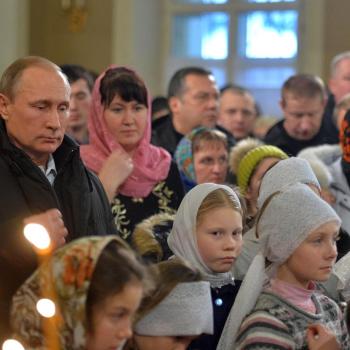Two historic events of the past week, namely the royal wedding and the beatification of Pope John Paul II, converge in the way they capture stories of hope.
The royal wedding is probably the more obvious of the two, since it's so fairy-tale-like. The scenes from Westminster Abbey, one of the world's great places of worship, could easily have fit into any grand Hollywood production. The exquisite choreography, the lofty words of the liturgy, even the sermon (citing Catherine of Siena: "Be who God meant you to be and you will set the world on fire")—all these elements served to lift the spirits of the one-third of humanity that watched it to consider what it would really be like to live "happily ever after."
There is something archetypal about a royal wedding and all it symbolizes. The couple has given their assent to a public life like no other: their marriage will for ever be a public thing, part of the nation's history and common memory. The children that come from this marriage, too, will be part of the nation's story. This marriage represents on a grand scale what every real marriage aims for on a smaller scale: entrance into a new state of life, characterized by a new public role and celebrated by a community as reflective of what it believes God is doing among them.
It is no surprise that so many fairy tales (and their Disney counterparts) end in marriage: Cinderella, Snow White, the Little Mermaid, Beauty and the Beast, and so on. For a marriage, and especially one that is the fruit of struggle, represents a forging of hope, even a kind of salvation. Feminists, of course, critique older fairy tales for the fact that the salvation usually involves a powerful man rescuing a helpless woman, and as a father of girls I too share a reticence about wanting my girls to think of themselves as princesses. Still, it is possible to rescue an idea that a marriage of equals is yet an act of hope, of choosing to forge a life path rooted in a noble love, a tenacious cooperation, a sacrificial tenderness. Such an act bears whispers of the Holy Spirit.
The beatification of the late pope is rather more like Catholic insider baseball, an idea foreign to many around the world. Yet what is easily understandable is the idea that a community reveres its heroes, celebrates their legacies by giving thanks for what they have done.
The leading edge of that thankfulness is the way the man lived an unapologetically faithful life as a Catholic, a priest, a bishop, a political figure, a writer, a man of history. He inspired hope among many around the world, and not only Catholics: many Jews, for example, laud him for being the first pope to pray in a synagogue, the first to visit a concentration camp, and the first to recognize the State of Israel. His famous apologies for the complicity of the Church in the Galileo trial, the slave trade, religious wars, prejudice against women, silence during the Holocaust, treatment of Orthodox churches, and others were seen by many as historic and a sign of a new era for the Catholic Church.
Perhaps most significantly, though, his encyclicals and his other works as a figure of global importance helped shape a hopeful vision of the human person in community. From his four-year catechesis on sexuality, now known today by the popular name "Theology of the Body," to his socioeconomic analysis in the encyclical Centesimus Annus (On Catholic Social Teaching) to his vigorous exploration of the beauty of the moral life in Veritatis Splendor (The Splendor of Truth) and Evangelium Vitae (The Gospel of Life), to name a few, Blessed John Paul II sought to offer from the storehouse of Catholic wisdom a vision of what the human being and the human family could be when rooted in love and stretching toward God in hope. He was no sectarian talking-head; he was a leader who reached from the heart of the Church out to the rest of the world that God loves.
In our information age, noble ideas are hard to find. The past week, while characterized by attention to these hopeful stories, has also created conversations about the shadow side of these stories. The history of Prince William's family is not a perfect one, nor is the history of Britain without stain. There are many who love John Paul II, but there are also many who criticize the fact that the crisis of sexual abuse was unchecked during his watch. In both stories, then, we can see something of the paradox that characterizes the human condition: we have an appetite for hope, yet find ourselves chewing on tainted food. Perhaps the appetite itself is a clue to why nothing in the world can ultimately satisfy the human heart, and why by God's grace we find ourselves restless until we rest in God.
5/2/2011 4:00:00 AM





